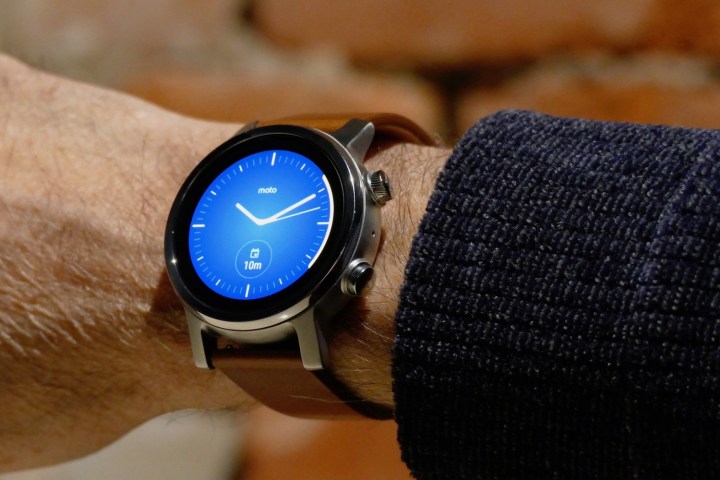
The Motorola Moto 360 is back, except things are a little different, as Motorola isn’t making this one. Instead it has licensed out the Moto 360 name to a brand partner called eBuyNow. The Moto 360 has gone the same way as Nokia, BlackBerry, and other tech resurrections. The firm insists this new model is deeply connected to the original Moto 360, and that it’s a step above the average smartwatch.
The return of the Moto 360

The $350 price certainly suggests a higher tier. It’s about $100 more expensive than most Fossil smartwatches, and getting close to the Apple Watch Series 5. In terms of specs, this is the equivalent of a 5th generation Fossil watch, so you get a Qualcomm Snapdragon 3100 processor, 1GB of RAM, 8GB memory, a 1.2-inch AMOLED screen, a heart rate sensor on the back, GPS, NFC, and Google’s WearOS software. It has quick charging — just 60 minutes to full capacity — and should last through the day.
So far, so familiar. What makes it different is the materials and the build quality. The Moto 360 is designed to appeal to those who appreciate what makes a traditional watch desirable. The body is made from 3 mm-thick stainless steel — twice that of other smartwatches eBuyNow told me — which is then covered in a PVD (similar to films found on solar panels) or DLC (diamond-like carbon) coating, giving the Moto 360 a pleasing texture I’m more used to seeing on watches that cost a lot more than $350.
Styling queues taken from the original Moto 360 are minimal, taking after it mostly in the simple overall design, but the new 360 stands apart from previous versions due to its two-button layout. This is a little more comfortable to wear, as there’s no crown to dig directly into your wrist, but it may not look as appealing to some. Thankfully, the Moto 360 pulls off this design very well, mostly because the top button features a textured finish with the Motorola logo inscribed, which I rather like.
Straps and software

The top button is multi-functional, and can be pushed to access the menu, held down for Google Assistant, or twisted to scroll through menus and notifications. It’s very natural too, and the tactility feels great against the tip of your finger. The lower button is programmable, as well. There are two straps inside the box — a leather version and a very flexible, high quality silicone strap.
It looked smart, stylish, and perfectly-sized when I strapped it on my wrist, but the thickness is slightly surprising, given the advances Fossil has shown in this area with its 5th generation smartwatches. For all Motorola’s bluster about the premium DLC and PVD coatings, it’s questionable whether regular smartwatch buyers really care about it, and whether it will encourage anyone to spend more on a Moto 360 than one of the more svelte Armani or Fossil watches.
The watch runs WearOS and doesn’t have any additional apps or special Motorola alterations at all. I was told that some software announcements may come when the watch goes on sale, but whether this would be a Google update or Motorola’s special features was not stated. During my limited time with the watch the software worked well and the menus moved smoothly and quickly. But it wasn’t connected to a phone, so the full experience may differ.
eBuyWho?

As mentioned, Motorola isn’t manufacturing the Moto 360, instead licensing out the name to eBuyNow, which it describes as a strategic brand partner. Heard of them? Me neither. In the press release for the smartwatch, eBuyNow says it’s an independent, data-driven consumer electronics manufacturer, and that it looks for gaps in the market to exploit. It seems the gap in release times from the last, well-regarded Moto 360 seemed a ripe opportunity.
At the London launch event, eBuyNow representatives spoke very positively about the Moto 360 smartwatch, its partnership with Qualcomm, and great relationship with Motorola. But what else has it made? It’s worked with Fitbit and Garmin as well, so it has experience in making wearables, and also lists Samsung, Panasonic, Toshiba, Sony, and Sharp as partners. It’s also responsible for Kodak, a licensing deal that appears similar to that with Motorola.
Conclusion

First impressions of the Moto 360 are good. It’s attractive, made from quality materials, and the design is elevated above the ordinary with the unusual side buttons. Still, it’s quite hard to justify the additional expense on the materials and build alone, as Fossil’s stylish watches are also great choices for a sizable amount less. Perhaps using the Moto 360 may reveal it to be operationally better than other WearOS watches out there, especially with a pending software additions pre-launch, so we’re keen to try it out more.
The Moto 360 will be available to buy in December through moto360.com, with pre-orders beginning in mid-November. The watch costs $350 or 340 British pounds.



